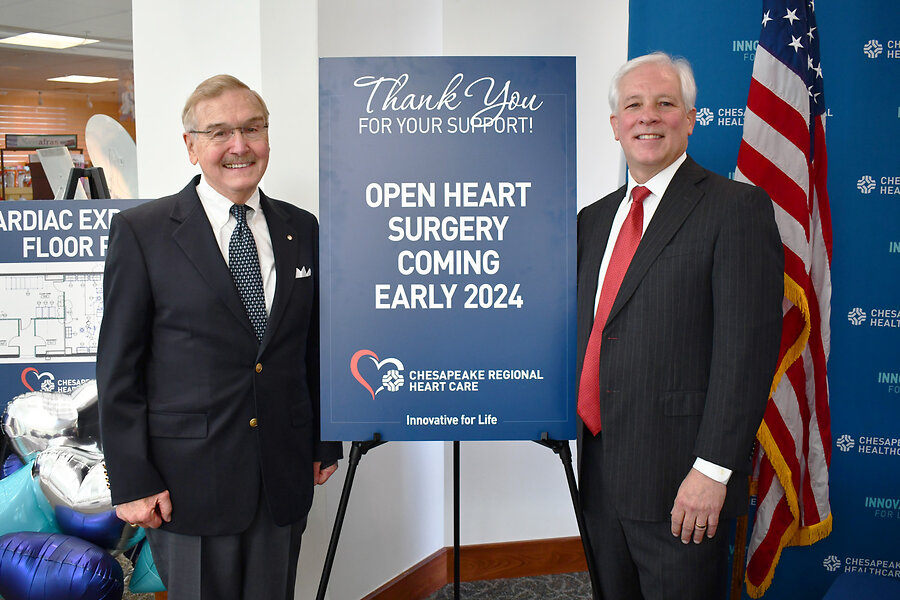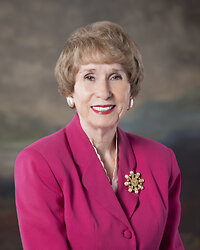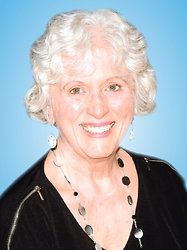CHESAPEAKE REGIONAL MEDICAL CENTER
State Health Commissioner approves request to introduce open-heart surgery at the hospital
by Kathy Van Mullekom

Dr. Donald Buckley and Mr. Reese Jackson
Chesapeake Regional Medical Center's unwavering commitment to serving the community ultimately helped the hospital win state approval to offer open-heart surgery. According to Chesapeake Regional Healthcare President and CEO Reese Jackson, the more than five-year approval process of twists, turns, and legal challenges wasn't easy. Still, the final outcome made it all worthwhile, and the hospital is laser-focused on the future.
"The expansion into open-heart surgery is a necessary and logical move that will give residents of southeastern Virginia and northeastern North Carolina better access to life-saving services closer to their homes and workplaces," Reese says. "We are so pleased and happy. It's perfect timing. We always thought we would prevail and made plans accordingly. We now have an opportunity to demonstrate the continued public need for this open-heart surgery program-a need that has only grown since our original proposal in 2017. Hiring and equipment installation is underway. By this time next year, we hope to perform our first open-heart surgery."
Celebrating its 47th anniversary this year, Chesapeake Regional Medical Center has always had an excellent reputation for its interventional cardiac program, which involves non-surgical treatment to open narrowed coronary arteries to improve blood flow to the heart. The hospital ranks in the top 90th percentile among hospitals nationally for its heart attack survival rate, and is the best in the region according to the Centers for Medicare and Medicaid Services. "With a heart attack, the faster you can intervene, the better the outcome," Reese explains.
Despite its excellent interventional cardiac care, critical patients who needed cardiac surgeons to do open-heart surgery had to be stabilized and kept in the hospital until they could be transferred elsewhere. According to Reese, there are a great number of such cases annually.
"Now, those patients can have their surgery here," he says, with pride in his voice. "That's not only beneficial for clinical reasons but for mental and emotional reasons, too. Can you imagine waiting seven to 10 days for surgery? That can be hard on a patient. By offering open-heart surgery, patients will not have to shuttle between providers or facilities to receive all the necessary care. It will ensure patients can get timely treatment."
One spacious hybrid operating room in the new cardiac wing will serve the specialized surgeons doing cardiac procedures. An anesthesiologist and nurses specially trained in open-heart cardiac surgery will assist.
There is already space for a second cardiac operating room as the program grows from the expected 150 surgeries in its first year to 250 in its second year. The city of Chesapeake is projected to grow from about 250,000 to 275,000 in the next seven years, and much of that growth will be people in the 65-plus range who will need open and closed heart surgery services.
Cardiac patients will be cared for in a universal bed model, which means they will be taken from the operating room to intensive care and stay there until they go home. Specially trained cardiac care nurses will be bedside around the clock every day of the year, and testing, such as imaging and drawing blood, will be done in each patient's room. There will be no need to wheel cardiac patients through long hallways to diagnostic testing areas.
"The expansion into
open-heart surgery
is a necessary and logical move
that will give residents of
southeastern Virginia
and northeastern North Carolina
better access to life-saving services
closer to their homes and workplaces."
open-heart surgery
is a necessary and logical move
that will give residents of
southeastern Virginia
and northeastern North Carolina
better access to life-saving services
closer to their homes and workplaces."
-Reese Jackson
"Surgery, cardiac recovery, and post-anesthesia care will all occur in the cardiac ICU," Reese notes. "In the cardiovascular ICU, patients typically go home about a day sooner. As a quality indicator, that is a good thing. These universal rooms are designed to help patients recover faster and return home."
The cardiovascular ICU will be on the fourth floor of the new Richard S. Bray Critical Care Tower. "The cardio ICU infrastructure is already there," Reese points out, "and the finishing touches are now being completed." Each of the eight cardiac patient rooms will be spacious enough to accommodate monitoring and testing equipment and include a private bathroom.
While the hospital recruits the additional staff needed, its current cardiac specialists are working with Reese to fine-tune preparations. Those leaders include Dr. Thomas L. Carter, director of cardiovascular surgery; Dr. Joseph Sposato, medical director of cardiology services; and Dr. Ashesh Buch, medical director of interventional cardiology services. Cardiologists from Tidewater Physicians Multispecialty Group (TPMG) and Bayview Physicians Group will continue with their medical privileges at Chesapeake Regional.
"Our main priority right now is staff recruitment and development," Reese says, who joined Chesapeake Regional Healthcare in 2016 and is leading the $135 million improvement project at its 310-bed facility on Battlefield Boulevard. "The people we hire will come with a lot of experience. These are highly educated, trained, skilled medical specialists. We have 11 different teams working independently as a super-user group, which will include surgeons, interventional cardiologists, and others on those subteams. We have a good road map, good cadence, and we look forward to it all coming together."
There is still much preparation to be completed before the first open-heart surgery is performed. The hospital is reaching out to other open-heart surgery units, asking for staff to observe and shadow their specialists. Teaching and team building will be intense and ongoing. "We will know when we are ready for that first open-heart surgery," Reese declares, "and we won't do anything until we are ready. We are already proficient in the management of surgical patients. Now we are focusing on how to best meet the unique needs of cardiac patients."
While there are standard protocols in surgical procedures for all specialties, Reese believes the teamwork, care, communication, and good chemistry among medical staff sets Chesapeake Regional apart from the others.
"In our corporate climate, there is something that allows good chemistry and collegiality to exist," he concludes. "It's more than just being friendly. It's feeling supported, feeling nurtured, feeling loved. The collegiality that exists here is what makes us special."
Chesapeake Regional Medical Center
736 Battlefield Blvd., North
Chesapeake, VA 23320
757-312-8121/757-589-9514
http://www.chesapeakeregional.com
CURRENT COLUMNS
Children First 
Dandelion Timeby Becky AdamsRelationships 
When Your Security Blanket is in the Dryerby Dr. Bill AustinPublisher’s Point 
Time To Moveby Jean Loxley-BarnardOn The Front Porch With You 
Memories of Homeby Rob Lauer

